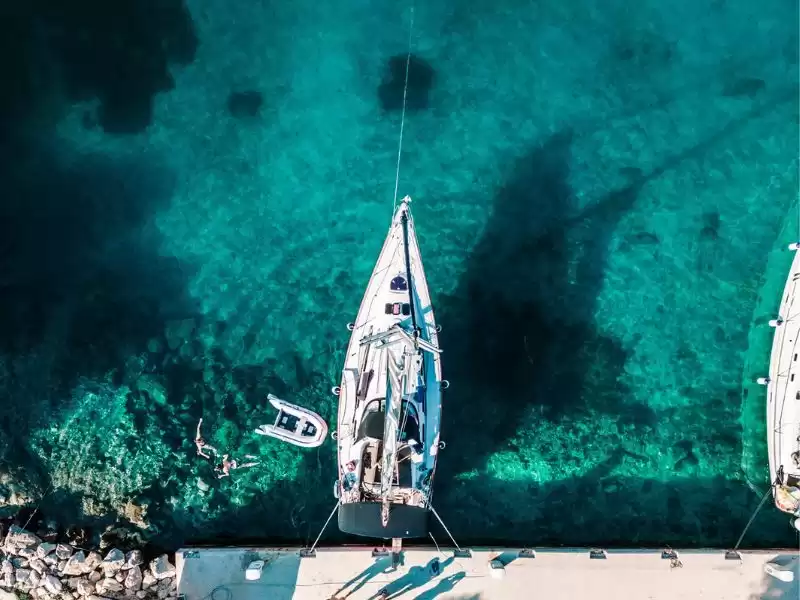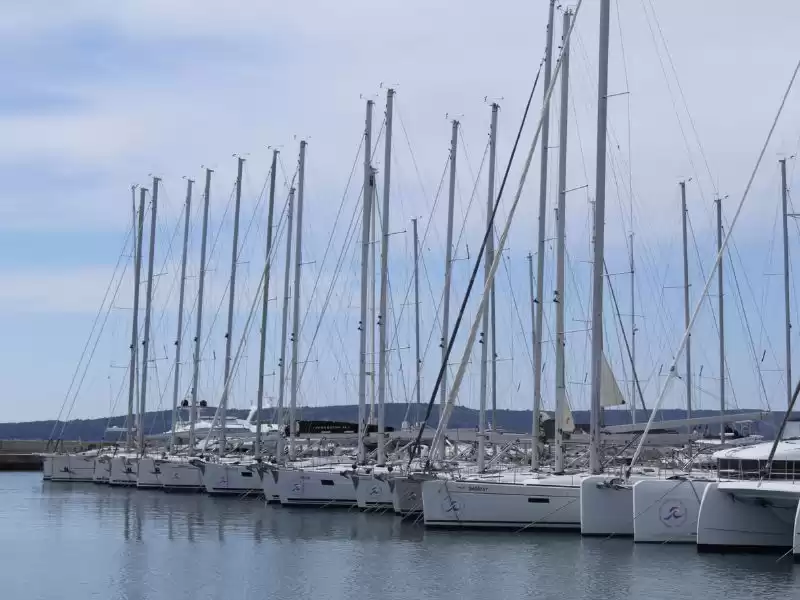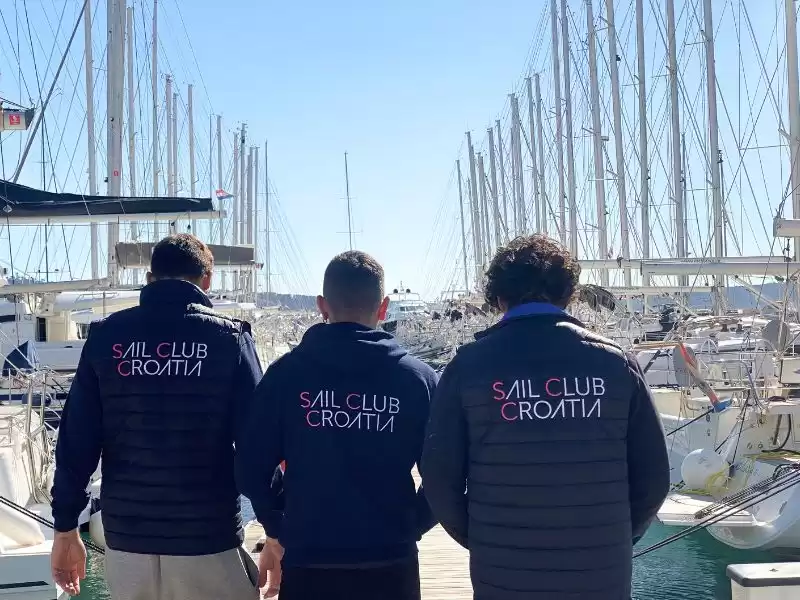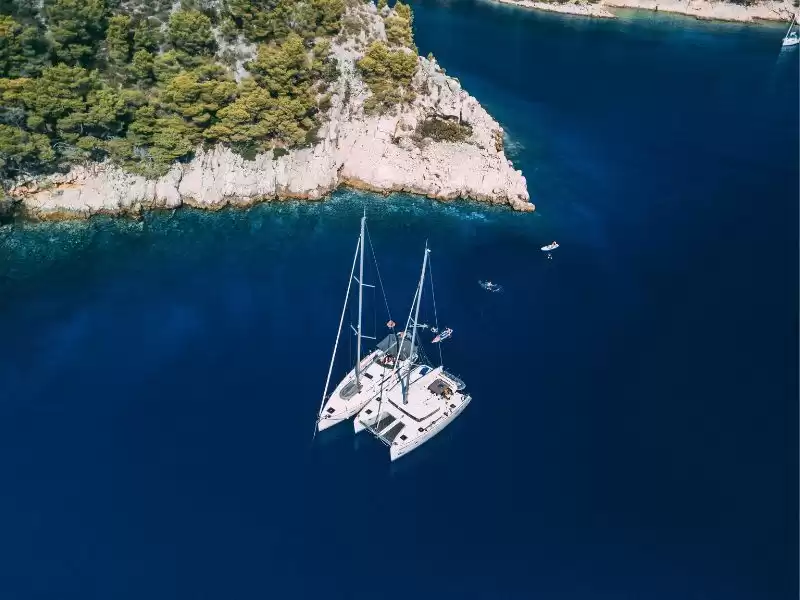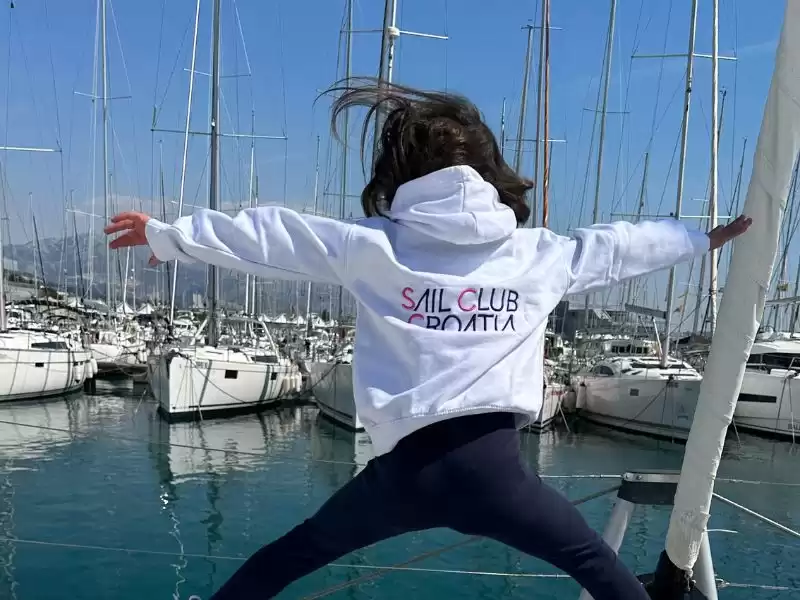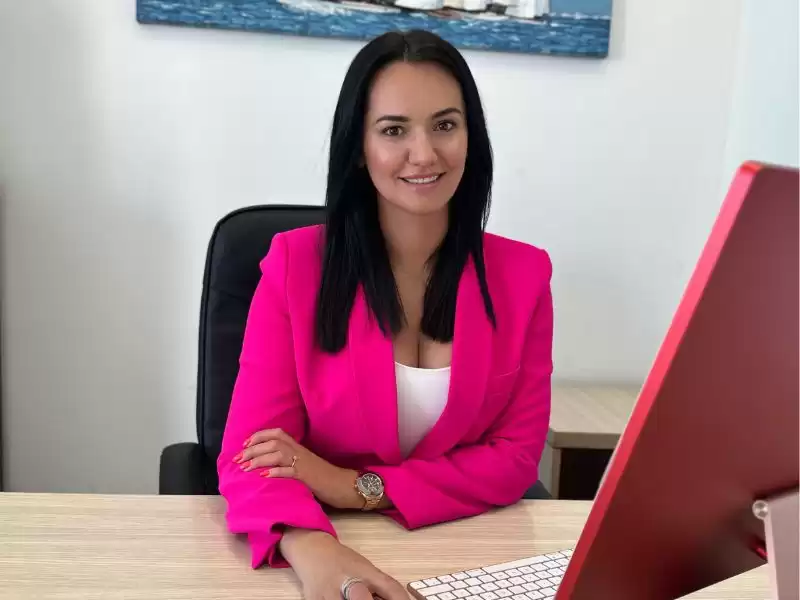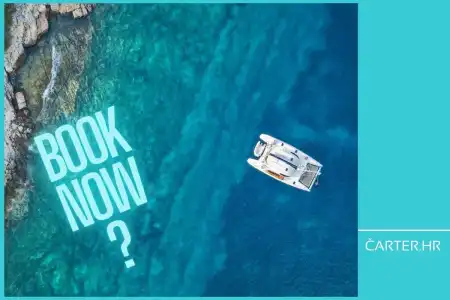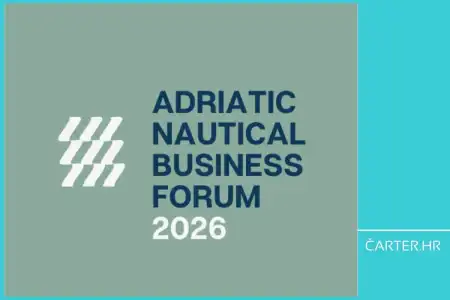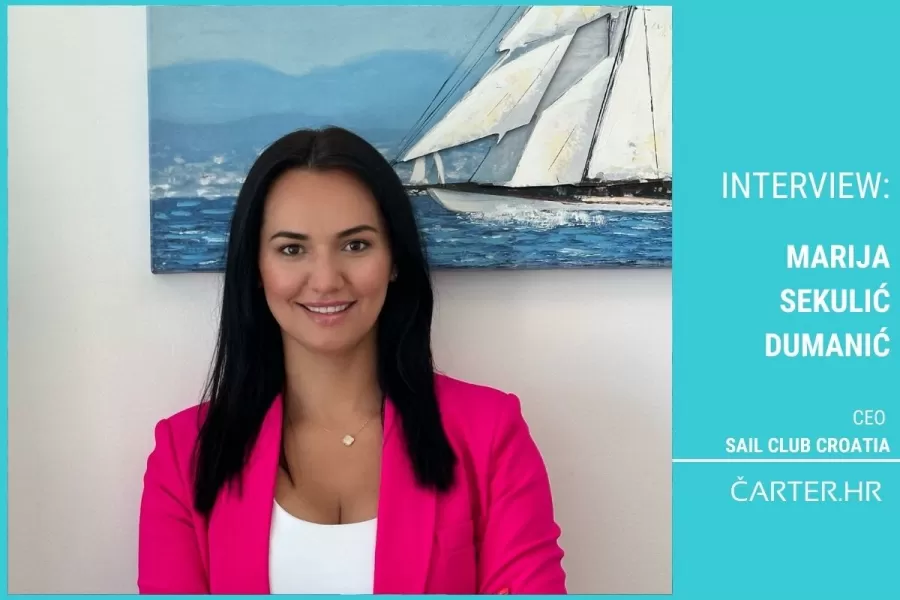
- 12.04.2023.
- News
"Our goal is to protect the sea we love and help build a more sustainable future. We are proud to be on a mission to make a positive impact - and invite all charters to join us on this journey".
Managing a charter company is challenging, but love is love, says Marija Sekulić Dumanić. We find out what it takes to modernize a charter company, what new ideas she has introduced and what she has done to make business and life easier.
She started with the rebranding in Sail Club Croatia, continued with ecological cleaning products, all the way to the use of digital tools and education. Let's not forget the adoption of dolphins. And as she says - she's just getting started.
Marija, you've been in nautical charter for 15 years, worked for different companies, and have been through a lot in this industry; how did you maintain your commitment to this job? Was sailing and chartering love at first sight, or did you have to "look twice"? Were there moments of doubt?
Some loves are eternal, and mine, with the charter, is definitely eternal love at first sight. When I applied for a job as a booking agent 15 years ago, during college, I thought I would work for one summer, but I'm still in the charter today. In fact, Sail Club Croatia is the second charter that I worked for. In the first one, I went through everything, from agent to manager. We also opened a shipyard then, so I participated in those processes as well. I was officially a booking manager, but you know how it goes in smaller companies - you do everything and gain experience, so I am familiar with everything in the charter and shipyard. So in an instant, I decided to move from Zagreb to Split.
Given that the charter was in Primošten and the shipyard in Dugopolje, I considered it a logical sequence considering the dedication to work. In yacht charter, you are always available. I had no problem with that because there was nothing nicer or dearer to me (and this is still the case today) than connecting the face of the guests with the emails we exchanged before their arrival and their satisfaction after returning from sailing.
After my child was born, I gave myself an ultimatum, either the job or the child, since I always give 100%, and it was unacceptable for me that either child or the job suffer, and I knew I couldn't do both. With a heavy heart, I decided to leave the charter at the end of my maternity leave. After a year and a half, in an informal conversation, former colleague and friend Mihael Primorac informed me that he and his partner had bought a yacht charter and offered me the director's position. I don't think there is a person who accepted a job offer faster without thinking or any agreed terms. The very thought of returning to the boats delighted me, and I didn't hesitate, and here I am for the third year at the head of the Sail Club Croatia.
When you took the helm at Sail Club Croatia, was it challenging for you to adapt to the new environment in which you found yourself?
Absolutely, taking over the company in the year after Coronavirus was challenging in every way. A new team of people doing the job in their own way, and a lot of other things had to be dealt with. By nature, I am a big fighter, and nothing is complicated for me; I have always worked better under pressure, so the challenge was more significant - proving to myself that I could do it.
Suppliers and partners have been more or less the same for years, and we had a good relationship, so we just renewed partnerships while I met some new ones and built cooperation. It wasn't easy, but the very fact that I'm not a new name in the industry helped to make the transition go smoothly.
And you, like the majority of our interviewees, did not immediately "sit" in the director's chair. We all know how difficult the road to success is. How much does your experience in booking help you today when running a yacht charter company?
Booking is the core business of the charter, and I consider it my biggest asset. From the beginning, I went through the manual management of bookings on paper lists, in-house solutions of booking programs, Sedna, MMK and Nausys. Well, I was among the pioneers of Facebook pages and nautical charter profiles and Google ads. Welcomed guests every weekend for many years, organised regattas, flotillas and teambuilding.
So today, I certainly apply all the experience I gained and learned in my work. And I have a rule that all my office employees must know how to make the booking and know the program and rules. By understanding the basic work of the booking department, they get a bigger picture and do their job better, be it marketing, administration, etc.
Do you understand some needs better today, and do you solve situations better because of the experience and knowledge you have? Do you think you would look at things around you differently, better or worse, without previous experience in the industry?
I believe that my biggest asset is precisely my experience and the fact that I have been following events in the yacht charter industry since the first day of entering the business. I've never been a panicky person, and I've always functioned well under pressure, but now I'm much less nervous. I'm familiar with 95% of the problems I could encounter and know how to approach the solution.
I am much calmer than before. Part of it is certainly up to experience, and part is due to my age and the maturity that comes with it.
People measure their own success, or the success of the company they lead, in various ways. Do you feel like you've achieved everything you've always wanted, or are you just getting started? How or with what can an individual actually measure success?
It may sound funny, but I measure it by my sleep, i.e. how soundly I sleep at night. I know what I wanted to do, I know what I still want to do and what I have to do, so I'm very pleased and sleep peacefully.
I'm not indebted to anyone, have a satisfied team of employees and new yachts in the fleet. I've just started, I think I can achieve a lot more, and I'm working on it.
After over 20 years of operating, Sail Club Croatia has gone through a complete rebranding. Does that mean that you are "putting things in order"? What encouraged you to take that step, and what changes did you want to reflect in Sail Club Croatia?
This year, the company celebrated its 20th anniversary. With all the changes I made to office procedures, the technical part, and the fleet itself, it seemed as the right time to refresh our logo and create a new look.
When SailCroatia started in the industry in 2003, it played it safe regarding brand and identity. Over the past 20 years, with over 10,000 successfully completed charters, they have surpassed many competitors in charter service, experience, customer care and more.
Now I wanted a rebranding that would reflect our new, younger and more lively personality; I wanted novelties that would reflect the new direction of our company. That's how SailCroatia became Sail Club Croatia. Ranging from soft and delicate pink to solid blue, our logo symbolises the Croatian sky full of colours that merge with the Adriatic Sea. There is nothing better than being on the water and being on vacation at the same time. The logo is a visual expression of the colours of sunsets that pass into the water on sunny summer days.
In short, we believe that we have finally elevated Sail Club Croatia from a reliable boat rental company to a mature, modern and innovative company with an incredibly bright future in the yacht charter domain. With this new, unique approach to branding, we finally feel like we've grown into the company we've always been behind closed doors.
I am convinced that my team, full of young people, has what it takes to make our clients' expectations higher and fulfilled every time they decide to sail with us! Because as our slogan says: Sailing Your way!
You didn't limit rebranding to changing your identity or updating your website. You have turned the entire business around. Every yacht charter wants to stand out with something "different", but it looks like SCC succeeds. With the change in approach, have you noticed changes in guest behaviour or in demand? Or is it still too early for any specific results?
Honestly, it's still too early for concrete results, but I can say that we've received only positive feedback. And that's what really makes me happy. That people have understood what kind of change we want and are introducing and that they accept and support it.
When you came to SCC, you started to change the ways and conditions of working, but the people are the ones most involved in the process of change and adaptation. How "difficult" was it to introduce changes to people who have been working in specific ways for years? Did you encounter resistance, or were the changes readily accepted?
That was actually the most challenging part of the job. From the human side, you don't want to change people and their way of working, and from the business side, you see mistakes and omissions that you have to solve if you want to move forward. This process of change was, of course, met with resistance. Still, those who were ready for change are now valued employees whose efforts have been rewarded multiple times (with a 30% increase in salary, annual awards and bonuses, top equipment free for personal use, and new vessels in the fleet ). I believe that they recognised my vision and are working in accordance with it.
Make no mistake, it wasn't an easy process, and indeed, money is not the only motivator for employees. It took some time for us to get to know each other, start to respect and share the same beliefs and put them into action.
A business change implies a complete turnaround in performing daily tasks. Have you introduced any new work processes, e.g. for booking or digital tools for yourself or your SCC team? To what extent are you, personally, and then your entire team, ready for innovations (primarily in digital technologies)?
I have always been and still am a supporter of everything new that will make my life and business easier. And I'm constantly improving myself and trying to keep up with the times, so I also went a step further in this process.
The best example is that I completed a digital marketing course at Aspira College last year to learn more about it. At the same time, all employees are involved in training and can propose additional training depending on their interests in business improvement.
We have introduced online check-in/out for guests; we use Tap2Review for detailed analyses and client ratings and Sentinel for tracking the vessel, consumption, etc. We have created an owner's portal where vessel owners have all information about the vessel in one place (booking, documents, accounts, pictures, financial statement) - to reduce paperwork, ease of access, and business transparency. Next in the plan is a 3D recording of the vessel to bring it closer to the guests at the start.
We have in-house marketing, and that person reads all possible data we receive and based on the analysis, we then make a plan. We advertise through all social networks, Google, and recently - influencers.
An advantage that I cannot stress enough is the fact that we are the youngest charter company in Croatia in terms of the age of our employees, and this is precisely a big wind in our backs because they all live in step with the times and accept the news without any problems, but also give their suggestions for improvement and introduction of something new.
The digital age has really made doing business easier. Still, the golden rule in tourism is that there is nothing better than a direct approach. So, in addition to all the digitalisation, a smile addressed to the guest and a short conversation with him to make him feel welcome is the final touch that pleases both the guest and us.
To clean and maintain your vessels, you use non-toxic, biodegradable products in your charter business. You have eco-friendly and even reusable products for your guests. How did you start this whole story? Who do you work with to advance your sustainability goals, and how beneficial have these relationships been?
I admit that I was most torn about this, not because I don't want this change but because I am committed to sustainability and bio-products. I'm aware of the severe impact of toxic cleaning products on marine life and the environment. But simply from some common opinion, nothing like a good acid/chemical can wash a boat. But we live from the sea, and it's sad that many people don't see the bigger picture and don't make the necessary changes, and a solution exists.
I work with the company NatureSafe Marine from Split, which produces a line of environmentally friendly cleaning products that are safe and effective. Using 100% biodegradable formulas, they ensure that their products don't leave any harmful residues that can harm marine life or contribute to marine pollution. This way, our goal is to protect the sea we love and help build a more sustainable future. We are proud to be on a mission to positively impact - and invite all charters to join us on this journey.
It's nice when you have people around you who think the same as you, so you quickly start joint ventures.
Sustainable navigation doesn't mean only using ecological resources, reducing fuel consumption, or using renewable energy sources - this also includes decreasing the noise level in navigation. Do you think that you are successfully implementing all the changes in your business as you planned? What challenges or obstacles have you faced in implementing these changes at SCC? How did you overcome them?
Uh, a lot of challenges, for sure. When you start with an idea in your head, everything seems simple, but it isn't. The biggest problem is educating the guests and explaining everything to them. Not everyone is environmentally conscious or wants to worry about it. But that doesn't discourage us.
When booking any of our vessels, the guest has a link on the confirmation that takes them to a page dedicated to sustainability, our plans and goals, and our expectations from guests. Those obstacles have certainly not been overcome, but step by step, everyone will understand how and why to care for the sea and marine flora and fauna.
You also regularly organise beach cleaning in the vicinity of Split and Kaštela. How were these initiatives accepted in your "neighbourhood" and by your guests and employees?
The whole of Sail Club Croatia team accepted this initiative very well; nothing was difficult for them. These people are born in Split or Kaštela and see it as something they do for themselves. It's a little different with guests; the only guests participating in these actions are German tourists familiar with the initiative from the beginning and happy to respond to the invitation.
Given that the current topic is the lack of quality and educated staff in all service activities, including in the yacht charter sector, how does SCC deal with this trend? Do you also have difficulty finding quality staff? How do you view the creation of new educational programs for training staff to work in the charter?
The problem already arises in the education system, which is, unfortunately, bad. Today, young people are graduating from maritime college without knowing what a charter is and how a charter works. Isn't that ridiculous? They didn't graduate from medicine but from maritime studies, majoring in marine management or even yachts and marinas. So where is the yacht charter?
Then it is up to us to educate, teach and improve that same staff. And the yacht charter is specific; in addition to the basic rules, there is a lot that can be learned only through dedicated work and time. Still, I think the initial learning process could be reduced with quality education.
The situation in the country is such that young people only think about colleges. Success is measured by such diplomas and membership cards. At the same time, the focus is wholly shifted from professional occupations, which are not attractive to young people at all. We need an overall reform of the school system, occupational review, and new adequate schools with programs related to the nautical charter. The children need to be animated to get them to learn a profession and foreign languages and speak at least one foreign language like their mother tongue. You have difficulty finding sailors today, not to mention electricians and mechanics.
In addition to permanent employees, we also have a problem with the lack of a seasonal workforce and the impossibility of temporary employment. By seasonal, I mean skippers and hostesses but also washers and cleaners. I consider the association of charterers to be the key here, which should be the one that will solve the already known lack of quality staff and education for those interested in a way to communicate this with the relevant ministries and start changes because it's in the interest of all of us to have the best possible staff.
But honestly, I don't see that happening. It is a pain point for every yacht charter, which has NOT been solved for years, and the problem is getting bigger.
How do you view the development of the Croatian charter, and how do you see us in the future? We are aware that the massiveness and this excessive number of vessels in the Adriatic are not something sustainable. Is there, in your opinion, a way for a charter in Croatia to limit the number of yachts and offer services that are not just 'boats and sea'?
To begin with, the state should finance profitable projects, encourage investment in nautical tourism, be more flexible and open to various projects, and stop rescuing sinking companies.
Investments are needed in the infrastructure of marinas and moorings and the complete offer on the Adriatic. I believe that charters should also be categorised as hotels and apartments. This would then give a clear picture of the charters, and the best ones would simply be singled out, and the number of vessels would certainly decrease and be more realistic. Unfortunately, anyone can open a charter company, regardless of the number, age and equipment of the vessel, because there are no rules and no check-ups.
For example, in the last 2 years, we have added 15 brand-new vessels from the factory to the fleet. 75% of the fleet is less than 5 years old, which is no small thing.
Each charter works for itself, but I think it's clear to all of us that the "sun and sea" alone are no longer enough. That may have happened before, but guests have changed and want more. Tailor-made has become a permanent work principle, and guests expect it; it's no longer reserved only for those with the deepest pockets. The standard has changed, and we have to keep up with it. Guests are more pampered than before and (justifiably) demand value for their money. It's up to us to provide them with the same value.
This is by no means an easy process, but it is necessary, and we really try to make them feel like they are the only ones in the world when they come on our vessel. Welcome packages, personalised itineraries with restaurant recommendations, and a large selection of accessories and services are just a tiny part of what makes us stand out from the crowd.
But the charter effort only is not enough. In general, all tourism service providers should be involved; restaurants, marinas, cafes, and services. Only in this way can we have sustainable tourism and a plan for the same.
I can't help but notice how HTZ's stand is getting smaller every year at every fair instead of getting more prominent so that we can be a partner country in all emitting countries. We have been offering the same thing at the stand for years, and the booth itself is out of fashion. I think we can do much more and better. We just need to get started and put the right people in leading positions.
The catchphrase you created - "Go green to save blue!" best describes your commitment. Therefore, we must highlight that SCC adopted dolphins from the Blue World Institute. What prompted you to adopt dolphins, and how does a yacht charter (or individual) adopt these magnificent creatures?
This story has a long history. Even as a child in the 7th grade, I had a chemistry teacher who was truly ecologically aware at the time (23 years ago!). Back in 1999, at her persuasion, the class adopted a dolphin from Lošinj. I remember the joy and pride it was for us as children. And so, fast forward to 2023 and the fair in Dusseldorf, where I was at a couple of booths of environmental associations and received an offer to adopt Oceania turtles. And I remembered those dolphins.
I immediately went to Google and saw that this possibility still exists. So I requested the adoption of 3 dolphins from the Blue World Institute. The process is straightforward: you choose between three offered rates and get a certificate after payment. We have adopted the dolphins Vivi, Stripi and Apple, who live around Vis, so we hope to meet them on one of the sailing trips. We get news from the institute about the activities of the dolphins.
I don't think there is a person who doesn't get happy when they meet dolphins in the sea, regardless of age, because they are indeed magnificent.
And finally, do you have any advice for your colleagues or other charter companies who wish to become more sustainable and environmentally friendly in their business? Or maybe they would like to adopt dolphins? :)
We are still the country with the cleanest sea, and I believe it's more important to preserve that same sea for the sake of the health of the marine ecosystem. Big things start with minor changes; it's essential to begin.
And watch out for dolphins while sailing, turn off your engines, follow them parallel, don't take advantage of their welcome, give them space, and don't feed them your food.
Categories of trends
- News
- Sale
- Marketing
- SEO
- Web design
- Social media
- Technology
- Regulations
- Management
- Education
- Finances
- User experience
Newsletter
Sign up for the newsletter and receive the latest trends and tips straight to your inbox
